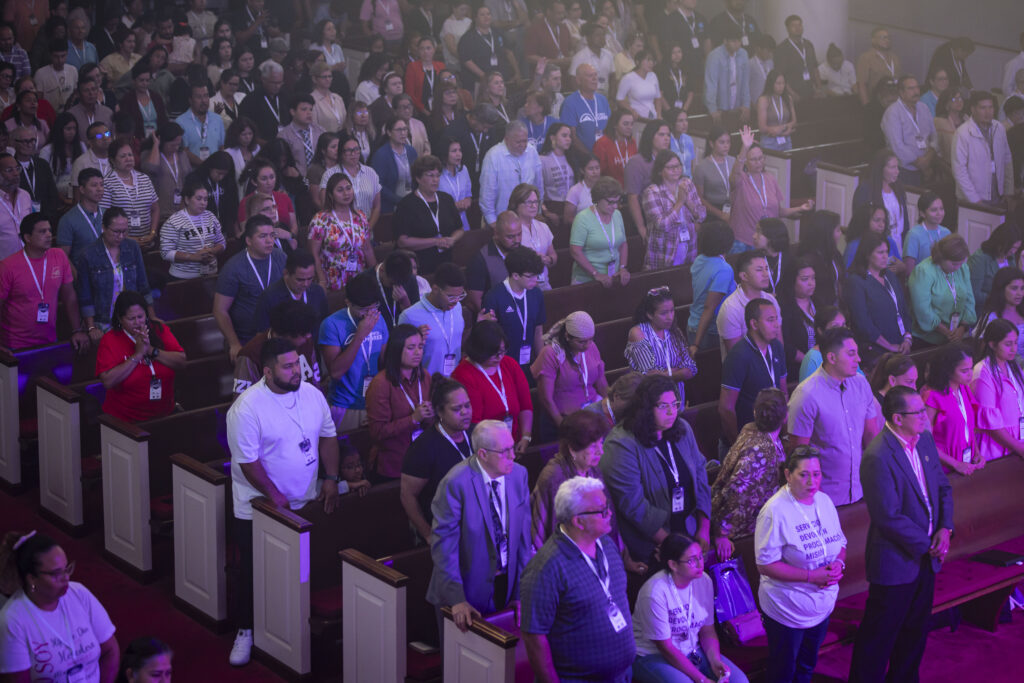
NOBTS Hispanic conference draws more than 700 attendees in third year
By Timothy Cockes/NOBTS
NEW ORLEANS (BP) – The “Abre Mis Ojos” conference (Spanish for “open my eyes”) gathered more than 700 guests from the Hispanic community at New Orleans Baptist Theological Seminary Sept. 20-21.

The third annual conference, developed by NOBTS as an intentional way to engage Hispanics, hosted guests from six states and more than 50 different churches. The event saw a record number of youth attendees, and 14 different nationalities were represented among all guests.
Fabio Castellanos, director of Spanish online education at New Orleans Baptist Theological Seminary, described the conference as a “miracle” for the Hispanic community.
“This is a unique initiative and team effort from the seminary and local Hispanic pastors,” Castellanos said. “It’s a miracle because it’s a special union and gathering of Southern Baptist Hispanics. I pray God continues to bless us in this way.”
Cory Barnes, dean of graduate studies for NOBTS, welcomed the crowd and explained how the conference connects to the mission of the institution.
“This conference and this night represent a profound blessing for us as a seminary,” Barnes said.
“Part of the vision for a seminary in New Orleans was to reach Hispanic peoples and equip Hispanic pastors in the Americas. Tonight is a reminder that through you and the pastors and leaders in this room, the Lord is gracious to allow us to participate in that work. It is also a reminder of the mission that the Lord has given us, and this mission is far bigger than the English language. I pray that this is a rich time of worship for you.”
The theme for this year’s conference was “The Character Matters.” Plenary speakers preached about the importance of Godly character and how to develop it.

Castellanos reminded attendees they have an active role to play in their own sanctification.
“From the Old Testament to the New Testament, God’s call has been constant and unchanging: listen, believe, and obey,” Castellanos said.
“Individuals are called to actively present themselves, make choices, and live in a manner that reflects their commitment to God. This involvement is crucial for growth and transformation in their spiritual journey.”
Bill Warren, NOBTS professor of New Testament and Greek, spoke about the urgent need for Christian character in the midst of a broken world, and the Bible’s role as the guide for building such character.
“Our goal is to reflect the image of God in our words, actions, attitudes and thoughts,” Warren said.
“We have a role to play in the formation of our character in that God works with us in our lives. This means that we need to purposely make decisions to let God work in our lives and to work with God in the transformation of our lives. We are to seek to have the fruit of the spirit as the characteristics of our character.”
Bárbaro Abel Marrero, president of the Baptist Convention of Western Cuba and dean of the Baptist Theological Seminary of Havana, preached about the importance of authentic Christian character.
“The authenticity of Christian character is manifested by different kinds of tests, either adversity or prosperity,” Marrero said. “Actually, prosperity is a more difficult test for spiritual life than adversity.”
John J.R. Lee discusses Paul’s Christology at MBTS fall faculty lecture
By Michaela Classen/MBTS
KANSAS CITY, Mo. (BP) – Midwestern Baptist Theological Seminary professor of New Testament John Lee addressed seminary faculty and staff on the importance of understanding Paul’s divine Christology in the Fall 2024 Faculty Lecture Sept. 19.

Each fall and spring semester, Midwestern Seminary leaders gather to enjoy a special luncheon and hear a lecture by a fellow faculty member. Lee’s lecture reflected his recent writing on Paul’s divine Christology and his broader research interests in New Testament Christology and early Jewish and Christian monotheism.
“Our semi-annual Faculty Lecture always proves to be an encouraging event,” said MBTS President Jason Allen. “It is another opportunity for our faculty to demonstrate quality scholarship for the Church. And that was no less true yesterday with Dr. John Lee’s lecture on high Christology. Dr. Lee is a gift to Midwestern Seminary and the local church, and I am thankful our students get to study with him.”
Lee’s lecture, titled “Jesus is Lord: A Conversation with Key Recent Proposals for Pauline Divine Christology,” critically examined four proposals by contemporary scholars for how to understand the relationship between Paul’s Jewish monotheism and his worship of Christ as divine.
“Many parts of Pauline writings imply that Jesus was the center of the apostle’s devotion and the recipient of his undivided commitment,” Lee began. “In what sense, however, was Paul the Apostle able to reconcile his Jewish monotheistic commitment, represented by the Shema, with his devotion to Jesus as a divine figure?”
Addressing the significance of this question for the Church since the first century, Lee noted that many people deny that first-century Jews could have believed in the divinity of Christ given their belief in one God. If these people are correct, Lee indicated, then the New Testament’s identification of Christ with God does not reflect the Old Testament beliefs of Christ’s earliest followers, including Paul.
Lee added, “Fortunately, however, we are not the first ones to wrestle with this important question of how Jewish monotheism and Christ’s divinity go hand in hand.”
In his lecture, Lee examined the answers that New Testament scholars Richard Bauckham, Larry Hurtado, Chris Tilling and N. T. Wright have proposed for how to understand the reconciliation of Paul’s monotheism and his worship of Jesus. For each scholar’s proposal, Lee provided a representative overview of key points, strengths and weaknesses.
“Despite the diversity of these proposals, there is a fundamental unity to the observations and conclusions of the four scholars that I have considered,” Lee said. “These four scholars working on Pauline Christology all conclude that the apostle uniquely identified Jesus of Nazareth with the one God of Israel. And the clear consensus among these scholars, as such, signifies that Paul’s Christology is essentially consistent with later authority and later orthodoxy.”
Lee went on to say, “I hope my critical interaction with them will be useful in defining and improving subsequent conversations on the topic.”














